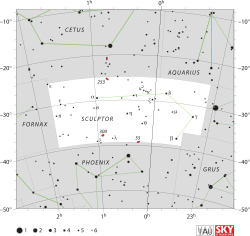Gamma Sculptoris
| Gamma Sculptoris (γ) | |
 | |
| Observationsdata Epok: J2000.0 | |
|---|---|
| Stjärnbild | Bildhuggaren |
| Rektascension | 23t 18m 49,44076s[1] |
| Deklination | -32° 31′ 55,2890″[1] |
| Skenbar magnitud () | +4,41[2] |
| Stjärntyp | |
| Spektraltyp | K1 III[3] |
| U–B | +1,06[4] |
| B–V | +1,13[4] |
| Astrometri | |
| Radialhastighet () | +15,60[5] km/s |
| Egenrörelse (µ) | RA: +20,13[1] mas/år Dek.: -77,72[1] mas/år |
| Parallax () | 18,74 ± 0,15[1] |
| Avstånd | 182 ± 2 lå (55,9 ± 0,6 pc) |
| Absolut magnitud () | +0,67[2] |
| Detaljer | |
| Massa | 1,60[6] M☉ |
| Radie | 12[7] R☉ |
| Luminositet | 72,41[2] L☉ |
| Temperatur | 4 578 ± 24[8] K |
| Metallicitet | -0,06[6] dex |
| Vinkelhastighet | 1,7[9] km/s |
| Ålder | 2,47[8] miljarder år |
| Andra beteckningar | |
| γ Scl, CD- 33° 16476, FK5 879, GC 32450, GJ 9821, HD 219784, HIP 115102, HR 8863, SAO 214444, GSC 07510-01089 [10] | |
Gamma Sculptoris (γ Sculptoris, förkortat Gamma Scl, γ Scl) som är stjärnans Bayerbeteckning, är en ensam stjärna[11] belägen i den västra delen av stjärnbilden Bildhuggaren. Den har en skenbar magnitud på 4,41[2] och är synlig för blotta ögat där ljusföroreningar ej förekommer. Baserat på parallaxmätning inom Hipparcosuppdraget på ca 17,9[1] mas, beräknas den befinna sig på ett avstånd på ca 182 ljusår (ca 56 parsek) från solen och rör sig borta från solen med en radiell hastighet på +15,6 km/s.[5]
Egenskaper
[redigera | redigera wikitext]Gamma Sculptoris är en orange till röd jättestjärna av spektralklass K1 III[3]. Den är en röd jättestjärna på den horisontella grenen[6], vilket innebär att den genererar energi genom fusion av helium i dess kärna. Den har en massa som är ca 1,6[6] gånger större än solens massa, en radie som är ca 12[7] gånger större än solens och utsänder från dess fotosfär ca 72[2] gånger mera energi än solen vid en effektiv temperatur på ca 4 580[8] K.
Källor
[redigera | redigera wikitext]- Den här artikeln är helt eller delvis baserad på material från engelskspråkiga Wikipedia, tidigare version.
Referenser
[redigera | redigera wikitext]- ^ [a b c d e f] Van Leeuwen, F. (2007). "Validation of the new Hipparcos reduction". Astronomy and Astrophysics. 474 (2): 653. arXiv:0708.1752 . Bibcode:2007A&A...474..653V. doi:10.1051/0004-6361:20078357. Vizier catalog entry
- ^ [a b c d e] Anderson, E.; Francis, Ch. (2012). "XHIP: An extended hipparcos compilation". Astronomy Letters. 38 (5): 331. arXiv:1108.4971 . Bibcode:2012AstL...38..331A. doi:10.1134/S1063773712050015. Vizier catalog entry
- ^ [a b] Hoffleit, D.; Warren, W. H. (1995). "VizieR Online Data Catalog: Bright Star Catalogue, 5th Revised Ed. (Hoffleit+, 1991)". VizieR On-line Data Catalog: V/50. Originally published in: 1964BS....C......0H. 5050. Bibcode:1995yCat.5050....0H.
- ^ [a b] Mallama, A. (2014). "Sloan Magnitudes for the Brightest Stars". The Journal of the American Association of Variable Star Observers. 42: 443. Bibcode:2014JAVSO..42..443M.Vizier catalog entry
- ^ [a b] Wilson, R. E. (1953). General Catalogue of Stellar Radial Velocities. Carnegie Institution for Science. Bibcode:1953GCRV..C......0W. LCCN 54001336.
- ^ [a b c d] Liu, Y. J.; Zhao, G.; Shi, J. R.; Pietrzynski, G.; Gieren, W. (2007). "The abundances of nearby red clump giants". Monthly Notices of the Royal Astronomical Society. 382 (2): 553. Bibcode:2007MNRAS.382..553L. doi:10.1111/j.1365-2966.2007.11852.x.
- ^ [a b] Allende Prieto, C.; Lambert, D. L. (1999). "Fundamental parameters of nearby stars from the comparison with evolutionary calculations: Masses, radii and effective temperatures". Astronomy and Astrophysics. 352: 555. arXiv:astro-ph/9911002 . Bibcode:1999A&A...352..555A. Vizier catalog entry
- ^ [a b c] Luck, R. Earle (2015). "Abundances in the Local Region. I. G and K Giants". Astronomical Journal. 150 (3). 88. arXiv:1507.01466 . Bibcode:2015AJ....150...88L. doi:10.1088/0004-6256/150/3/88.Vizier catalog entry
- ^ De Medeiros, J. R.; Alves, S.; Udry, S.; Andersen, J.; Nordström, B.; Mayor, M. (2014). "A catalog of rotational and radial velocities for evolved stars". Astronomy & Astrophysics. 561: A126. arXiv:1312.3474 . Bibcode:2014A&A...561A.126D. doi:10.1051/0004-6361/201220762. Vizier catalog entry
- ^ "gam Scl". SIMBAD. Centre de données astronomiques de Strasbourg. Hämtad 2017-12-03.
- ^ Eggleton, P. P.; Tokovinin, A. A. (September 2008). "A catalogue of multiplicity among bright stellar systems". Monthly Notices of the Royal Astronomical Society. 389 (2): 869–879. arXiv:0806.2878 . Bibcode:2008MNRAS.389..869E. doi:10.1111/j.1365-2966.2008.13596.x.
Externa länkar
[redigera | redigera wikitext]
| ||||||||||||||||




